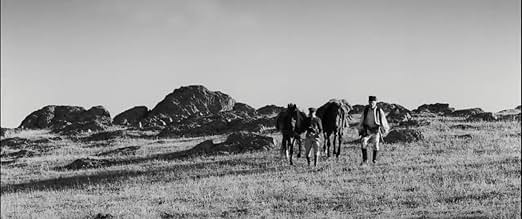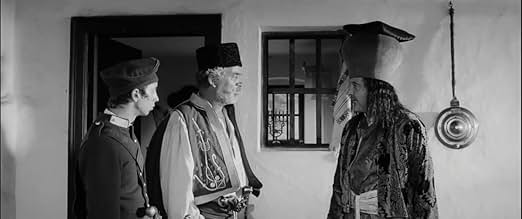Añade un argumento en tu idiomaSet in early 19th century Romania, a policeman, Costandin, is hired by a nobleman to find a Gypsy slave who has run away from his estate after having an affair with his wife.Set in early 19th century Romania, a policeman, Costandin, is hired by a nobleman to find a Gypsy slave who has run away from his estate after having an affair with his wife.Set in early 19th century Romania, a policeman, Costandin, is hired by a nobleman to find a Gypsy slave who has run away from his estate after having an affair with his wife.
- Premios
- 23 premios y 7 nominaciones en total
Argumento
¿Sabías que...?
- Curiosidades"Aferim!" is an Ottoman Turkish expression meaning "Bravo!".
- PifiasWhen she talks with Constandin, Smaranda calls him Carfin once.
- Citas
The Priest: Each nation has its purpose. The Jews, to cheat, the Turks, to do harm, us Romanians to love and suffer like Christ. And each has their habits. Hebrews reads a lot, Greeks talks a lot, Turks has many wives, Arabs has many teeth, Germans smokes a lot, Hungarians eats a lot, Russians drinks a lot, English thinks a lot, French likes fashion a lot, Armenians are lazy, Circassians wears much lace, Italians lies a lot, Serbians cheats a lot, Gypsies get beaten! Gypsies must be slaves.
- ConexionesFeatured in Bir Sigmund Weinberg belge-meseli (2020)
- Banda sonoraTipto tiptis
Original music composed by Antonie Pantoleon-Petroveanu (as Anton Pann)
Performed by Florin Iordan, Marian Cleante (violin), Sandu Constantin (vocals), Gheorghe Falcaru (whistle)
Folks who know the history of Romanian cinema and remember some of the films made decades back will recognize elements of atmosphere and quotes. The 'Eastern' genre which took the structure of the classical American Westerns bringing on screen local characters or even changing the landscape to the fields, forests and mountains of the Romanian countries was popular in the 70s with the 'Haidouk' series but also in the works of Dan Pita (the 'Ardelenii' series). The inspired black and white cinematography credited to Marius Panduru and the very conventional generic that opens the film brought in mind the even older 'Tudor' by Lucian Bratu made in 1962 which dealt with events that took place 14 years before the year 1835 when 'Aferim!' is situated. The violently naturalistic nature of some of the scenes has also its roots in the Romanian literature (Liviu Rebreanu's novels) which were also brought to screen.
Yet, this film aims more. The story of the local sheriff (let us use this name for the sake of the international audience) and of his son searching for a fugitive gypsy in the forest and swamps of Wallachia is not just a road movie or an initiation story from the perspective of the young lad destined to inherit the profession of his father. It is a deep and cruel reflection of the prevailing attitude not only of the ruling class but of the whole or great majority of the population of Romania towards other nationalities. The story and the characters come in a frontal manner against deeply rooted stereotypes like the welcoming attitude of Romanians towards strangers or the positive role of the Orthodox church in the moral fiber and education of the masses. It is actually a priest who speaks on screen a tirade full of prejudice against all categories of strangers living or getting in contact with the Romanian at that time - Gypsies of course, but also Jews, Turks, Russians, etc. Folks less familiar with the history of Romania should know that by 1835 Romania was still broken into smaller countries under Turkish, Austrian and Russian rulers - so what is seen on screen has a historical perspective. It is however the relation with the present that comes in mind immediately for those who know history and present. Romania as other East European countries have a big social and ethnic problem with the lack of integration of part of their Roma (gypsy) minorities. The roots of this situation lay to a great extent to the slavery practiced on this minority until mid 19th century. Slavery was abolished (in 1855-1856) but prejudices stay.
The merit of Radu Jude is to avoid any excuse or sweetening of the historical facts, while telling a coherent story and creating characters who are not only credible but also memorable. He carefully builds the atmosphere, habits, language of the time in a well documented manner. He is helped by a fine team of actors - Teodor Corban and Mihai Comanoiu as the father and son, Toma Cuzin as the fugitive (would have deserved maybe more screen time to give more complexity to his character), and Alexandru Dabija as the cruel but credible landlord. Two of the best actors of Romania from the older generation Victor Rebengiuc and Luminita Gheorghiu appear in short roles, which shows that even important artists were interested to be part of this cinematographic experience. I feel that 'Aferim!' is a film that was much talked about since its release, and will be even more talked about in the future.
- dromasca
- 2 oct 2015
- Enlace permanente
Selecciones populares
- How long is Aferim!?Con tecnología de Alexa
Detalles
- Fecha de lanzamiento
- Países de origen
- Sitio oficial
- Idiomas
- Títulos en diferentes países
- 追拿吉普賽!
- Localizaciones del rodaje
- Empresas productoras
- Ver más compañías en los créditos en IMDbPro
Taquilla
- Presupuesto
- 1.250.000 € (estimación)
- Recaudación en Estados Unidos y Canadá
- 108.110 US$
- Fin de semana de estreno en EE. UU. y Canadá
- 15.892 US$
- 24 ene 2016
- Recaudación en todo el mundo
- 350.110 US$
- Duración1 hora 48 minutos
- Color
- Relación de aspecto
- 2.35 : 1
Contribuir a esta página

















